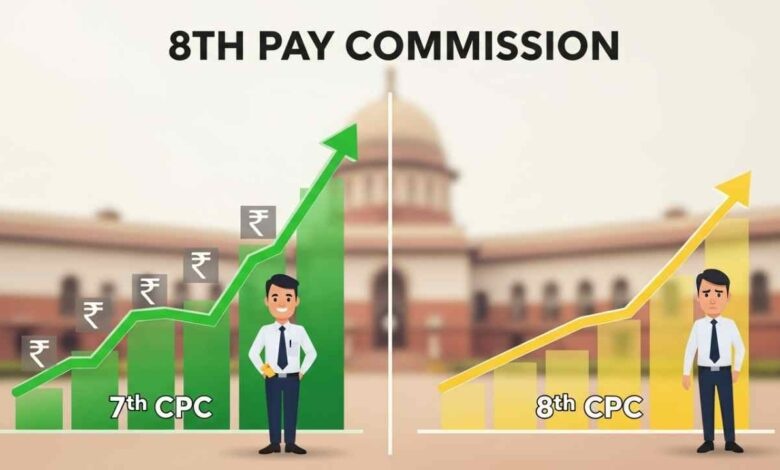
Speculation Surrounding Salary Increases for Central Government Employees
The ongoing debate about the 8th Pay Commission has sparked significant concern among central government employees. While the commission’s recommendations are expected to enhance salaries, preliminary reports suggest a potential slowdown in the rate of increase compared to the 7th Pay Commission. This uncertainty has led to widespread speculation about the actual impact on employees’ financial stability. The core of the discussion centers on the Fitment Factor, a critical element that determines how much basic pay will be adjusted. Previously set at 2.57 under the 7th Pay Commission, this factor is now rumored to be reduced to 1.8, which could significantly alter the salary hike. If this change is implemented, the basic pay increase for employees could be approximately 80%, pushing the minimum basic pay from Rs 18,000 to around Rs 32,000. However, the exact implications remain unclear, prompting further analysis of the potential effects on in-hand salaries.
Dearness Allowance Reset and Its Financial Implications
A key aspect of the 8th Pay Commission’s proposal involves the reset of Dearness Allowance (DA). Under the current system, DA stands at 55%, but this will be nullified once the new pay structure is implemented. Instead, DA will be integrated into the basic pay, starting from zero in the revised framework. While this adjustment aims to streamline salary calculations, it raises concerns about the overall real purchasing power of employees. Even with an increase in basic pay, the elimination of DA could offset these gains, leading to a smaller net salary hike. This scenario has caused alarm among employees, who fear that their financial benefits may not match the proposed adjustments. The interplay between basic pay increases and DA resets is a critical factor that will shape the final outcome of the commission’s recommendations.
Employee Unions Push for Higher Fitment Factor
Government employee unions have expressed strong opposition to the proposed reduction in the Fitment Factor, arguing that it undermines the financial security of workers. They are demanding that the factor remain at the 7th Pay Commission’s level of 2.57 or be raised further. This stance reflects the broader concerns about the long-term implications of the commission’s decisions. The unions believe that a lower Fitment Factor could lead to stagnant wages and reduced living standards, especially in light of rising inflation and cost-of-living expenses. Their ongoing negotiations with the government highlight the political and economic complexities surrounding the pay commission. The outcome of these discussions will be crucial in determining whether the final recommendations will prioritize employee welfare or fiscal constraints.
Timeline for Implementation and Future Implications
The 8th Pay Commission is expected to be established in the coming months, with its recommendations likely to take effect around 2026. This timeline aligns with the traditional ten-year cycle for such commissions, though the exact implementation date remains uncertain. The delay in finalizing the recommendations has created a period of uncertainty for employees, who are closely monitoring developments. The commission’s decisions will have far-reaching consequences for the financial stability of millions of government workers. As the government and unions continue their discussions, the final outcome will shape not only individual salaries but also the broader economic landscape for public sector employees. The resolution of these negotiations will be a pivotal moment for the future of government employment in India.
Key Considerations for Central Government Employees
The potential adjustments under the 8th Pay Commission underscore the importance of proactive financial planning for central government employees. While the exact details of the recommendations remain under review, the proposed changes to the Fitment Factor and DA reset highlight the need for careful analysis of their long-term effects. Employees are advised to stay informed about the commission’s progress and engage with their respective unions to advocate for fair compensation. The final decision will balance fiscal responsibility with the need to maintain competitive salaries in a rapidly evolving economic environment. As the discussions progress, the outcome will serve as a critical reference point for future pay reforms in the public sector.




